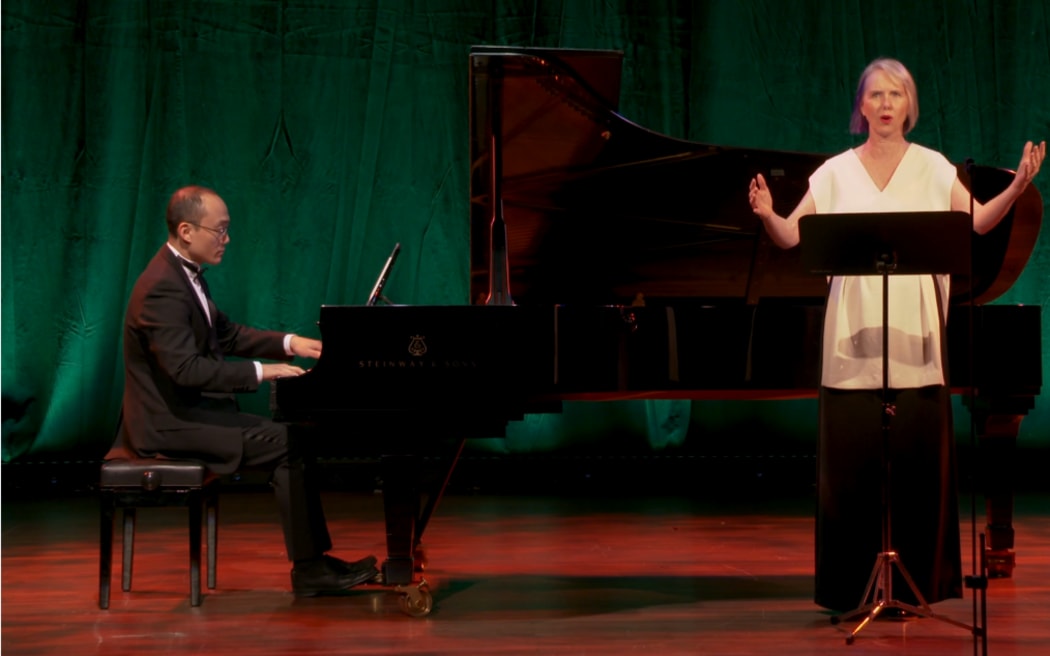 This summer Leila took a research trip to Ghana, also returning to her father’s birthplace in the Kumasi region. Her research is part of a West African four-year research insight program Afrinum project headed by Emmanuelle Olivier at the school of social sciences in Paris (l’EHESS) funded by the French National Research Association (L’ANR’). Leila’s previous projects and publications at her research lab Critical Sonic Practice Lab
This summer Leila took a research trip to Ghana, also returning to her father’s birthplace in the Kumasi region. Her research is part of a West African four-year research insight program Afrinum project headed by Emmanuelle Olivier at the school of social sciences in Paris (l’EHESS) funded by the French National Research Association (L’ANR’). Leila’s previous projects and publications at her research lab Critical Sonic Practice Lab
Radio New Zealand Broadcast
In other Aotearoa news: Leila’s soprano and piano setting of Tusiata Avia’s poem “Massacre” about the 2019 mosque shootings features on Radio New Zealand. “World Premiere of 21 x 21 by soprano Jenny Wollerman and concert pianist Jian Liu artfully pairs Aotearoa’s female composers and poets in 21 newly written songs celebrating the unique cultural and social kaupapa of Māori and Pākehā.” Jenny’s project will release all 21 songs as an album and songbook of scores.
Program Note “Massacre”
There is a pristine colonial manicured garden city filled with a radical underbelly of musicians, artists, and activists; this is Christchurch. I grew up in a place where I encountered racist experiences from being a little girl being called the ‘N’ word at school and countless other microagressions that I thought were normal and that made me feel like I did not belong; this place is also Christchurch. These competing notions of this place I called home shaped how I view the world today. I’m proud of this community and the interconnectedness that people showed each other during and after the 2011 earthquake, yet these two Christchurches still exist and lead to the events that inspired this piece.
When I was asked by Jenny Wollerman to work with a New Zealand female poet, I thought of Tusiata Avia who I’d met years before in New York. When I saw her poem Massacre I immediately knew that this was a song I could write: it resonated on so many levels. When the Christchurch massacre happened, I’d just started teaching at NYU. I heard a Muslim leader on the news say that the public could support the community by going to mosque in solidarity, and I’d never been to one. I went to the NYU mosque and saw the community—everyone mourning, a girl in tears because she felt so scared that people were coming to attack them. They asked me to speak on behalf of faculty, and as someone from Christchurch, along with interfaith leaders, a Christian priest, a Muslim imam and Jewish rabbi. The feeling of togetherness was palpable. When I saw this poem, I knew that I needed to make this a piece of music as a remembrance. This is not an easy poem or piece, but it’s real. The massacre really happened and we must never forget that ignorance can take violent forms, and that we must be vigilant in our daily quest for peace. The piece begins with the ‘Thursday 14 March’ section, with dreamy birdlike piano to lower driving chords becoming blurred, with an abstract vocal style including microtones influenced by Māori waiata. In the next selected section ‘Sunday 17 March,’ I demonstrate the opposites and irony of the poem as I move through different textures from vocals and piano that edges towards schmaltzy and romantic juxtaposed with brutalist Russian Ustvolskayan style piano. The piece developed into arpeggios reminiscent of Schubert’s Wintereisse but laced with Arabic scales.
Listen Radio New Zealand’s broadcast of 21×21: Aotearoa New Zealand Festival of the Arts 2022 and Avia and Adu-Gilmore’s “Massacre” on RNZ
Poem Excerpt: “Massacre”
When I arrive in Auckland and Hine learns that I have moved back to Christchurch
she asks me if I know it is a bad place
it is built on a swamp
many bad things have been done to Māori there
Read the full text of Tusiata Avia’s poem “Massacre” published in The Spinoff: Read Tusiata Avia’s “Massacre”
New Works
In other Aotearoa news, Fellow USA-based New Zealander Henry Wong Doe commissioned Leila for a new piano and electronics composition exploring the concept of home through her childhood in Aotearoa and the object of the piano itself. The recording project was funded by Creative NZ for kiwi composers in Aotearoa and abroad: Penelope Axtens, Leonie Holmes, Gemma Peacocke. Poulima Salima and Alex Taylor. will be released by Rattle Records and will be released by Rattle Records.
Leila is excited to collaborate with Celine Thackston’s chatterbird ensemble in a new piece recalling Ghanaian Ashanti symbology featuring soloist and bassoonist, Maya Stone. Chatterbird was awarded organizational development grant New Music USA alongside new works for JayVe Montgomery and Joshua Dent. Previously, during COVID-19 lockdown, Leila composed and sung alongside soprano Rebekah Alexander and chatterbird’s large chamber ensemble viewable as the audiovisual experience: Mahakala Oratorio
